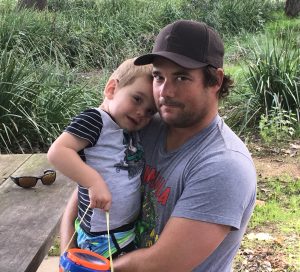Six years working at sea for the Australian Government has changed Phil Martin’s life forever.
In the last couple of weeks, this Dad from Bega has started to open up and share his experience with Post Traumatic Stress Disorder (PTSD).
Blogging on Facebook doesn’t come naturally to Phil, but he says it was a ‘spur of the moment thing’ at a time when he felt ‘out of sorts’ and just needed to ‘get it out’.
The first post on the PTSD – Life Behind the Curtains Facebook page came on March 22 and Phil says the response has been positive.
“For me, this is something that has remained behind the curtains, and I think that has been part of the problem, not having the capacity to talk about it,” Phil says.
This 35-year-old father of three kids under eight was first diagnosed with PTSD five years ago.
“2012 – they refer to it as the date of injury,’ Phil explains.
“From that point on things started to get pretty hard and heavy.”
Phil isn’t in a position to talk about his work in detail but says he was in an operational role at sea, away from home for extended periods of time and involved in some pretty stressful situations.
“I was involved in a significant amount of rescues and there is only so much you can take,” Phil says.
Leading up to his 2012 diagnosis, Phil says he ‘bottled it all up’ unable to speak of what he was seeing and doing and of the compounding stress inside.
“One of the driving factors was the amount of anger that I had when I was at home,” Phil says.
“And while I am suffering through this, so is my family.
“My wife has stood by me, and my eldest…it’s definitely had an impact on him,” Phil says.
First growing up in Port Macquarie on the New South Wales Mid North Coast, Phil moved to Bega when he was in year nine at school.
Phil draws strength from the coastal environment of the Bega Valley, ‘salt water therapy’ is how he describes it.
Diving and surfing are part of an active recovery plan and safety net, that now includes advocacy for those who remain behind their own curtain with PTSD.
By speaking out and sharing his story through the blog, Phil wants to empower others to get the help they need before alcohol, drugs, and thoughts of suicide take hold.
“For me, this is part of who I am now, it’s something that will never go away, so I have to manage it,” Phil says.
“Ninety percent of my energy goes to managing my PTSD.
“What I do is look for the things that help me…definitely the support of professionals, personal training…psychologists, psychiatrists…and organisations like Soldier On,” Phil explains.
Any sense of shame or stigma he may have felt about reaching out or discussing his PTSD is now gone for Phil, and that is what he is wanting to model for others.
Sitting on the banks of the Bega River with his two-year boy Max playing with toy cars around us, Phil is energised as he says, “If you put it out there, it opens it up, that’s what’s helped.”
As he goes about helping and empowering others he is helping and empowering himself.
Click play to hear more from Phil and his insights into PTSD…
A real gear change in Phil’s thinking came when PTSD was described to him as an ‘injury’.
“A lot of the stigma with PTSD is that it can be seen as a weakness, but this isn’t something that you can control, it’s something that you are exposed to,” he says.
“I have been injured…it’s just a different way to understand what is happening.”
In Phil’s case, this is a workplace injury and his focus is rebuilding and rebooting his families future.
“One thing to remember is that everyone has their own battles, the best thing you can do is just be kind to one another,” Phil says.
Time away for work has allowed Phil to be more involved with his children and as Max pokes about with his cars and watches kookaburras, it’s clear that Phil’s family is also part of his safety net.
Speaking about his eight-year-old son, Phil says, “He sees a different side of me now.”
“I spend a bit of time at his school working with the kids, encouraging the kids to be proactive with their time.
“I think he has definitely seen an improvement in my behaviour at home, which has also been reflected in his behaviour,” Phil says.
In the future, Phil is wanting to spend less energy managing his PSTD, and give some of that 90% load back to day to day life including a career.
For those reading this and needing to take the first step in living better with PTSD, Phil’s advice is ‘see your GP’.
“If there is something that is not quite right and you need to talk to someone, that’s the first place to go,” Phil says.
To talk to someone right now call Lifeline on 13 11 14. For further advice and information, check out Phil’s blog – PTSD: Life behind the curtains, or go to Beyond Blue, The Black Dog Institute, or Soldier On.







